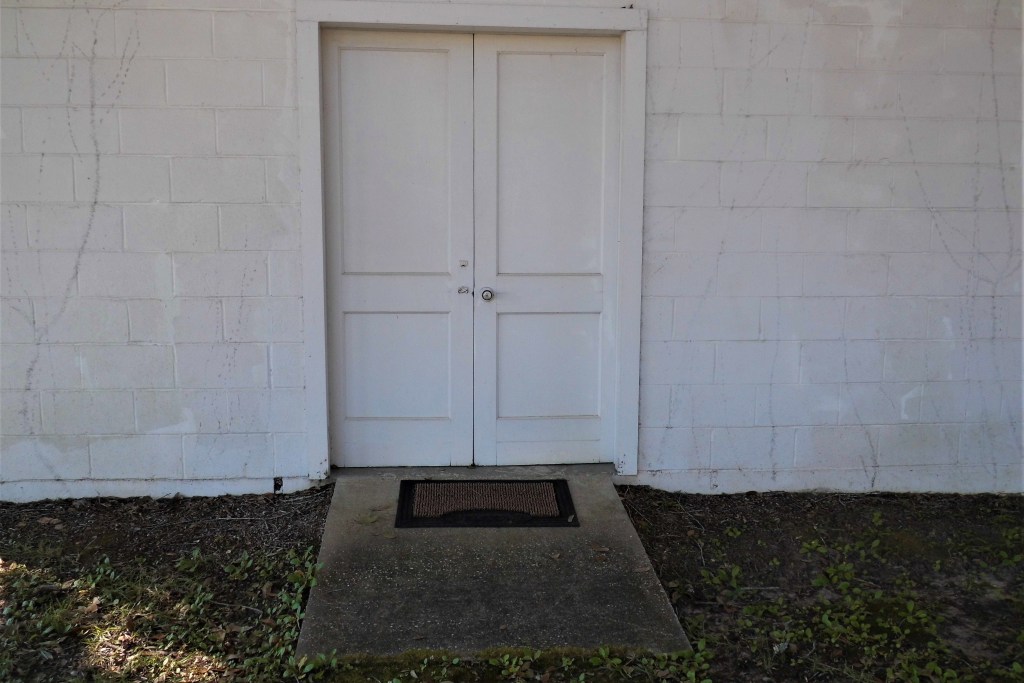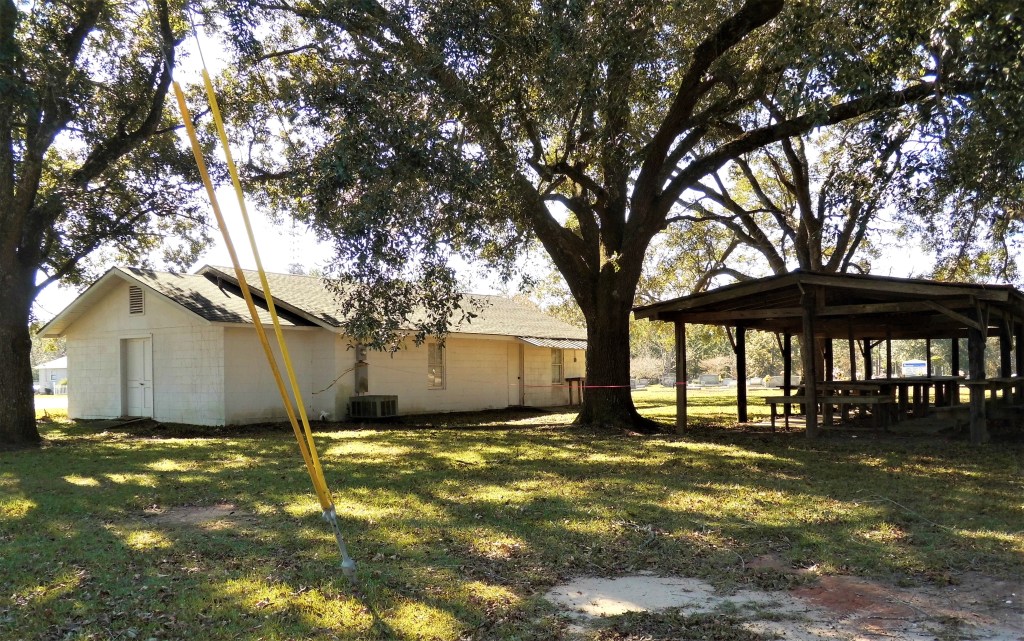
When you exit our little cul-de-sac and turn right onto the county road, you won’t go far before coming to an intersection. For a long time it was a four-way stop, but a traffic light was installed there a couple of years ago. Another right turn takes you to all the civilization and commerce you could ever want.
We’ve lived out here in the county for over thirty-five years and have seen a lot of changes – more subdivisions, more stores, and more churches.
There are two churches sitting diagonally at our intersection. One is a modern Disciples of Christ with a gym-fellowship hall as a separate building, and two playgrounds in the back.
The other church is an older, small, cinder block building, sitting close to the side of the road. There is no parking lot. It has an open air shelter with picnic tables for dinner on the grounds and a cemetery at the back of the building. It has never had a sign out front telling passers-by who they are. I occasionally saw a few vehicles there on Sunday mornings, but it took a long time to recognize the pattern. They only met on third Sundays. Sometimes they had dinner on the grounds after worship.
So after thirty-five years, my curiosity got the best of me, and I decided to visit them one Sunday morning. There were two cars and a truck parked in the yard, so I had no trouble finding a place to park. As I approached the front door, I wondered if they even allow people to visit, since there was no church sign out front, but I was relieved to see a welcome mat at my feet. Hearing singing as I entered, I realized I was late, so I slipped into a pew a few rows back from the people.

There were five members present that morning. Three older ladies were on the first two rows, an older gentleman sat in a chair facing them and another man on a side pew to his right. They were so engrossed in their singing they didn’t notice when I came in. I’m pushing seventy myself, but they all appeared to be pretty far beyond my age.
They sang a cappella from a small hymn book. As one song ended, the man in the chair announced the next number and kept time by slapping his hand on his knee. It sounded like Sacred Harp music that I’d heard in North Alabama. Some call it Shaped Note Singing or Fa So La, but it has an unmistakable quality of harmony and rhythm. I took a hymnal from the pew rack in front of me and found only lyrics. They knew these tunes by heart, but none were familiar to me. I recognized that all the verses were adapted from the Psalms, but I couldn’t sing along. They must have sung for more than twenty minutes before the song leader looked up and was surprised to see me sitting there.
“Oh! We have a visitor,” he said.
Everyone turned their head back toward the front door and smiled to greet me. The leader arose, coming to shake my hand. This was pre-pandemic, of course. He introduced everyone, saying he leads the singing and sometimes tries to be the preacher, “but they’ve all heard it from me before.” One lady said, “There are only seven of us left. Two couldn’t come today, and everybody else is out back.” (Referring to the cemetery.)
The preacher asked me what church I went to, and I said, “I’m Methodist.” He stood in the aisle beside me and told me they are Primitive Baptist, and went on to explain a little about the denomination. He said, “We stick to the old ways.” When he asked if I’d ever heard of them, I said that I think my maternal grandfather was raised one. And I asked, “Isn’t that also called Hardshell Baptist?” A lady in front of me said dryly, “That’s what they call us.”
We chatted about twenty minutes, with the two ladies in front of me saying they are sisters who grew up on this land as their family farm. Their daddy had donated this corner lot and built the church with his bare hands. He named the church Zion. There’s no sign out front because they don’t believe in evangelizing in the traditional sense. All the rest of their family property was sold many years ago.

The preacher, having a new audience, went up behind the biggest pulpit I’ve ever seen. It was elevated and took up over half the space in front of the small room. Now that I think about it, the imposing size and shape were very much like a judge’s bench in courtroom.
Then for forty-five minutes he made sure this Arminian heard all five TULIP principles, understood the difference between gospel conversion and regeneration by the Holy Spirit, and heard all the scriptures that used the word “SHALL.” He preached with much fervor, but I kept getting distracted by the wonderful smells of fried chicken and other delights that were on the table in the corner behind us. They had invited me to stay for dinner. Surely he would finish soon.
After the sermon, prayer, and another hymn, the preacher asked one of the ladies if she had the minutes for the business session. She did. She moved to a little table below the pulpit and read them aloud. Then there were a list of questions for the little congregation to answer.
“Has there been peace in the Body since our last gathering?” All answered in the affirmative. That question impressed me. What if all congregations were asked that question each week?
But I could see this may continue a while longer, so I tried to slip out as unnoticed as I had slipped in. I could eat lunch at home, which was just around the corner. But no such luck. The preacher called to me, “Aren’t you staying to eat with us?”
I looked at my watch and replied, “No thank you. I’m sorry. I really have to run. I’ve enjoyed it. The Lord bless you.” And I made my exit out the door.
I wonder how those people are doing now. I think of them and pray for them as I pass the little church. I haven’t noticed any vehicles parked in the yard on third Sundays during the pandemic.
I wonder what will become of the building when they widen our two lane roads to four or five lanes. Who has joined the other members “out back,” and who will tend the Zion cemetery when these dear ones are all gone.

Congregations die out when they don’t reproduce. There are many factors at fault, but churches have a life cycle just as people do. The Invisible Church, the Church Triumphant, the Bride, the Body of Christ, the Family of God transcends denominational labels and lives on into eternity. But those are individuals, not groups or organizations.
I pray for revival in these challenging times. I pray for a new Jesus movement among our young people, and I pray for renewal of the power and joy of the Holy Spirit among us in this broken world.
Shalom, Dottie
If it were possible, I’d say this was your best post I’ve read to date Ms. Dottie. I so enjoyed your messages beyond the message. Your denomination and ordinances are man-made; and none are as important as your salvation through Christ Jesus, our Lord. Another message I received loud and clear was the importance to honor and respect our older Christians and their traditions. What’s wrong with having a traditional service now and again? In fact, maybe if there were more of the old ways observed, the church wouldn’t be in the mess it’s in. Loved the message; and will be joining you in prayers for Zion.
LikeLike
Oh, thank you so much for your feedback! I try to be the Queen of Subtle and say a lot beneath the surface. I want readers to think, not just skim for the obvious. I’m glad you get it.
LikeLike